If you’re on a low-carb food diet or simply aiming to reduce your carb intake, you might be curious about the food options available. It’s not uncommon for individuals on low-carb diets to have questions about the carb content of certain foods, such as quinoa and oatmeal. These are considered healthy whole grains containing carbs and significant nutritional value. Additionally, you may be wondering about the carb content of various vegetables, fruits, and proteins.
Regardless of the specific diet you’re following, it’s important to feel safe and to incorporate a diverse range of foods from all the food groups, including grains.
Here, we suggest that individuals on a low-carb diet aim for approximately 40 percent of their daily caloric intake to come from carbs, which amounts to at least 120 grams of carbs per day. This approach allows for a well-rounded diet that provides all the necessary nutrients. It’s also more manageable and less restrictive compared to extremely low-carb diets like the ketogenic diet.
Table of Contents
Please keep reading to discover our selection of the top 30 healthy low-carb foods you can enjoy. All carbohydrate amounts and nutritional values mentioned are based on USDA’s FoodData Central database data.
Low-Carb Grains
Quinoa:
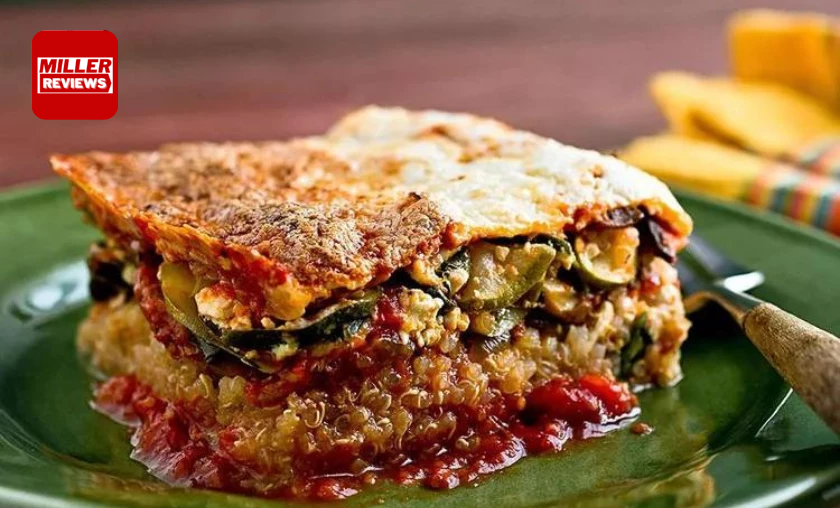
Pictured Recipe: Quinoa Lasagna
1/2 cup cooked quinoa = 18 g carbohydrates
Let’s talk about Quinoa, darlings. It’s quite a popular grain, receiving quite the fanfare, and rightfully so! This little powerhouse boasts a generous amount of protein and fiber, with approximately 8 grams of protein and 5 grams of fiber per cup, as per our friends at the USDA. However, my dears, don’t be fooled into thinking it’s a low-carb miracle. Oh no! A mere half cup of cooked quinoa contains around 18 grams of carbohydrates. So, my lovelies, if you’re indulging in this nutritious grain, be sure to plan accordingly and factor those carbs into your daily intake. It’s all about balance..
Oatmeal:
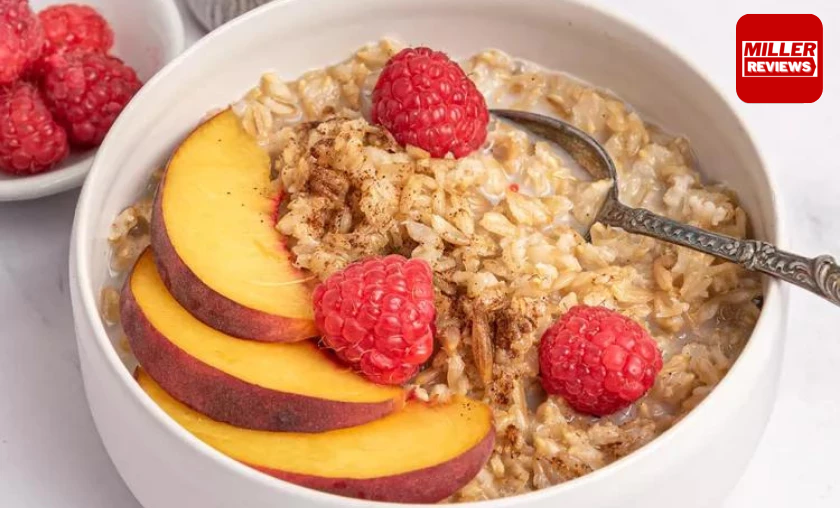
Pictured Recipe: Old-Fashioned Oatmeal
1 cup of cooked oatmeal = 27 g carbohydrates
When it comes to indulging in a big bowl of carbs, even on a low-carb diet, let me introduce you to the glorious world of oatmeal. You see, oats have a secret weapon called beta-glucan, which works wonders for slowing down digestion and improving those blood cholesterol levels. It’s all backed up by a 2019 review in Nutrients, so you know it’s the real deal.
Whether you prefer old-fashioned, quick-cooking, or steel-cut oats or elegant steel-cut oats, they all share a similar carb content of about 27 grams per half cup when measured dry. Oh, but my dear, let me give you a little tip: opt for plain versions instead of those tempting flavored instant oats. Those little devils tend to come with a hefty amount of added sugar, and we don’t need that in our lives. Choose wisely, my loves, and let the oatmeal goodness nourish your soul without the unnecessary sweetness.
Polenta:
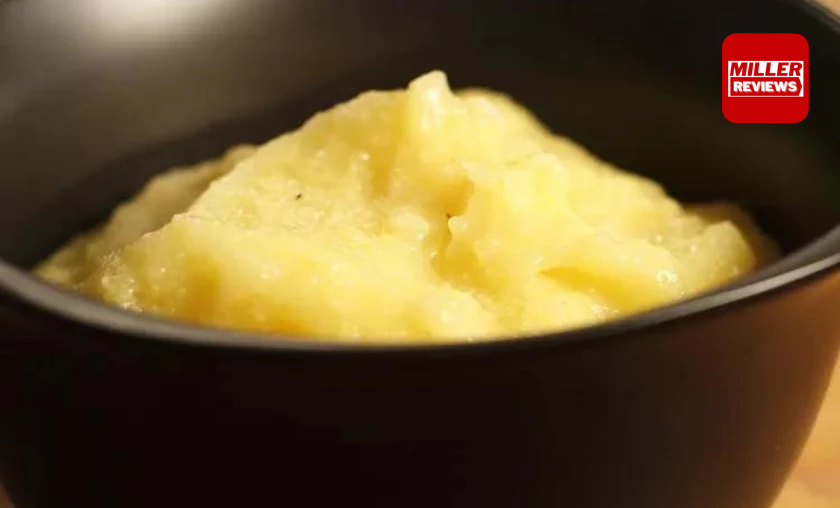
Pictured Recipe: Creamy Polenta
1 cup cooked polenta = 30 g carbohydrates
Let’s talk about polenta, my darlings. This delightful dish, crafted from glorious cornmeal, possesses a texture reminiscent of the beloved Cream of Wheat. Now, you have a couple of options to enjoy this culinary delight. You can either create it from scratch in the comfort of your own kitchen or opt for the convenience of ready-to-eat polenta available in handy rolls that you can slice to your heart’s content.
Here’s the exciting part: a half cup of polenta will only set you back 15 grams of those elusive carbohydrates. Isn’t that simply marvelous? Oh, and let’s not forget, my loves, polenta is a fantastic choice if you happen to have Celiac disease or gluten sensitivity, as it is gloriously gluten-free. So fear not, for even on a gluten-free diet, you can indulge in the joys of polenta. It’s time to explore the wonderful world of healthy recipes that beautifully replace carbs with delightful veggies. Let’s embark on this flavorful journey together, my darlings.
Low-Carb Proteins
Eggs:

Pictured Recipe: Parmesan Cloud Eggs
One large egg = 0.5 g carbohydrates
A large egg is a marvelous package of nutrition, my darlings. According to the USDA, it provides 6 grams of protein, 5 grams of fat, and 0 grams of carbs, all within a delightful 72-calorie frame. Here’s a fascinating revelation from a 2022 review in Nutrients: the yolk, contrary to popular belief, holds nearly half of an egg’s protein. And fear not, my loves, for 2019 research in the American Journal of Clinical Nutrition assures us that eggs, despite containing cholesterol, do not increase the risk of heart disease, even for those with a sensitivity gene. They also bless us with vital nutrients like vitamin D, lutein, and choline. Eggs truly are nature’s gift to our well-being.
Beef:
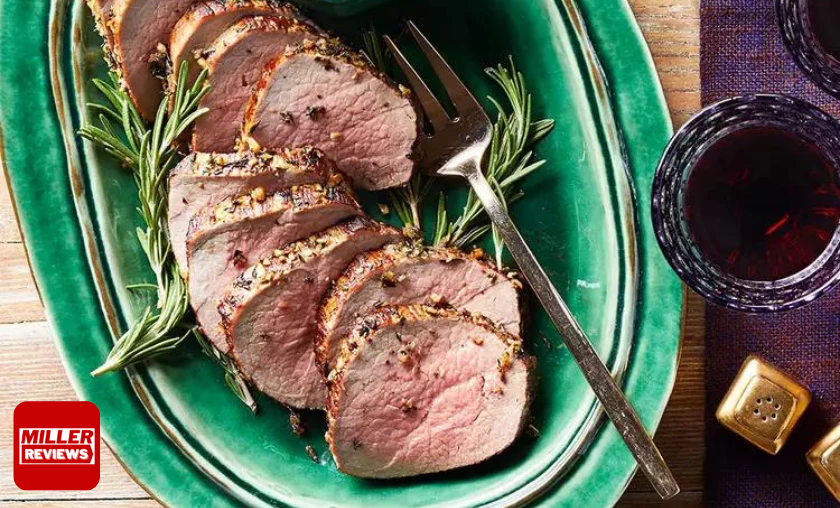
Pictured Recipe: Garlic-Rosemary Roast Beef with Horseradish Sauce
4-ounce beef, round, top round (raw) = 0 g carbohydrate
It’s a wonderful game to indulge in because it’s all about that protein goodness without any pesky carbs or fiber to worry about. Now, while the chicken is a well-known champion when it comes to lean protein, don’t you fret, my loves, because beef has some fantastic options too. The USDA has deemed certain cuts of beef as “lean” or “extra lean.” So, when making your wise choices, consider delectable options like the eye of round roast, top round roast, bottom round roast, and top sirloin steak. With these delightful selections, you can savor the joys of protein-rich meats while keeping things lean and fabulous.
Hemp Seeds:
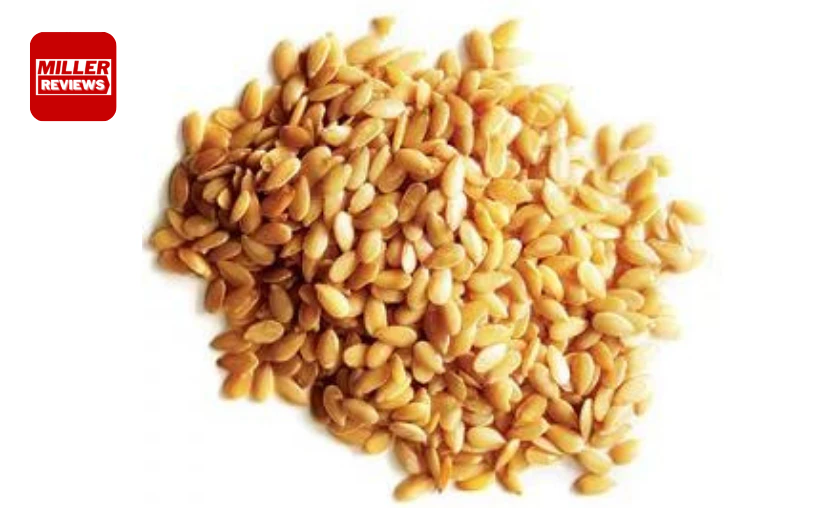
3 tablespoons hemp seeds = 2.6 g carbohydrates
They hold the power to elevate your meals with their nutty crunch and provide a splendid source of vegetarian protein. Imagine sprinkling them gracefully over yogurt, salads, or even a comforting bowl of oatmeal. It’s a delightful way to enhance both flavor and nutrition.
According to our trusted friends at the USDA, a serving of 3 tablespoons of these miraculous hemp seeds gifts us with 9.5 grams of protein, 1 gram of fiber, and a modest 166 calories. Isn’t that simply marvelous?
But wait my loves, there’s more. These remarkable hemp seeds are not just about protein and crunch. They also boast a wealth of other essential nutrients. They are a rich source of magnificent magnesium and precious zinc. So, my darlings, embrace the magic of hemp seeds and let them grace your meals with their nutritional prowess, delightful crunch, and countless possibilities.
Shrimp:
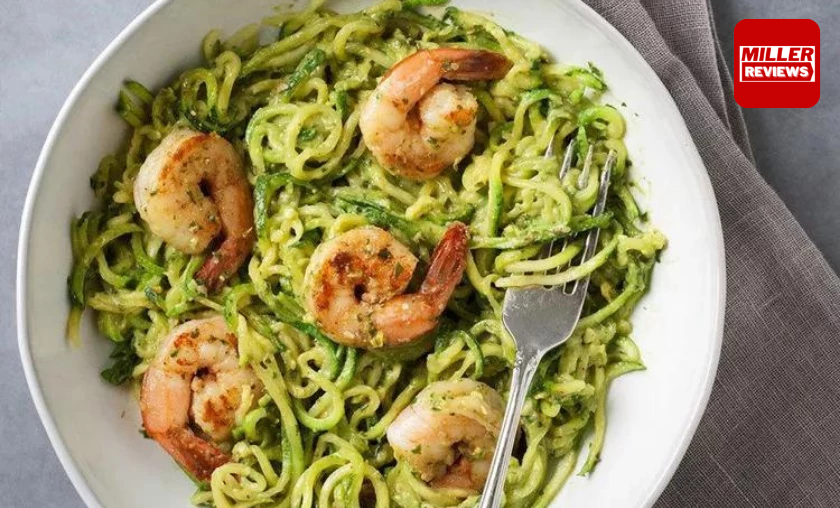
Pictured Recipe: Zucchini Noodles with Avocado Pesto & Shrimp
3-ounce shrimp (cooked) = 0.17 g carbohydrates
They are an excellent addition to your meals, particularly if you’re on a weight loss journey. According to the trustworthy USDA, just three ounces of shrimp will gift you a remarkable 20 grams of protein, all while keeping your calorie count at a mere 84. Isn’t that simply splendid?
Now, my loves, here’s a little tip for you: when preparing these delightful shrimp, opt for methods like grilling or lightly sautéing. You see, breading and frying tend to add unnecessary calories, and we certainly don’t need those, do we?
To spark your culinary imagination, I invite you to explore our marvelous collection of Healthy Shrimp Recipes. It’s a treasure trove of meal ideas and inspiration to elevate your shrimp game and keep your taste buds dancing. Embrace the wonders of shrimp, my darlings, and let them contribute to your weight loss journey with their protein-packed goodness and delightful flavors.
Soy:
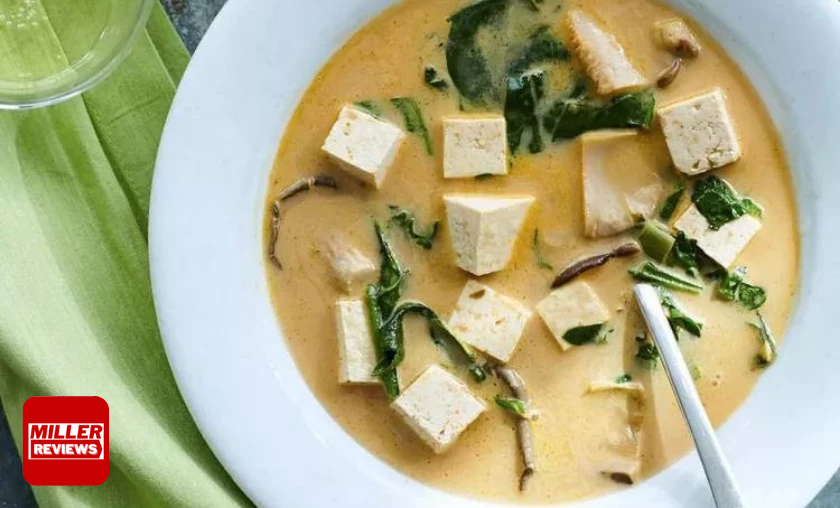
Pictured Recipe: Thai Coconut Curry Soup
3-ounce extra-firm tofu = 2 g carbohydrates
Soy is a fantastic choice for protein with few carbs, my darlings. According to the USDA, extra-firm tofu offers 13 grams of protein & just 2 grams of carbs in a 3-ounce serving. Edamame, the delightful soybean, boasts 18.5 grams of protein and 14 grams of carbs in a cup. As for soymilk, one cup provides 7 grams of protein and 4 grams of carbs. Remember, my loves, to choose unsweetened soymilk, as sweetened versions contain double the carbs due to added sugar. Embrace the wonders of soy for protein-rich, low-carb goodness.
Seitan:
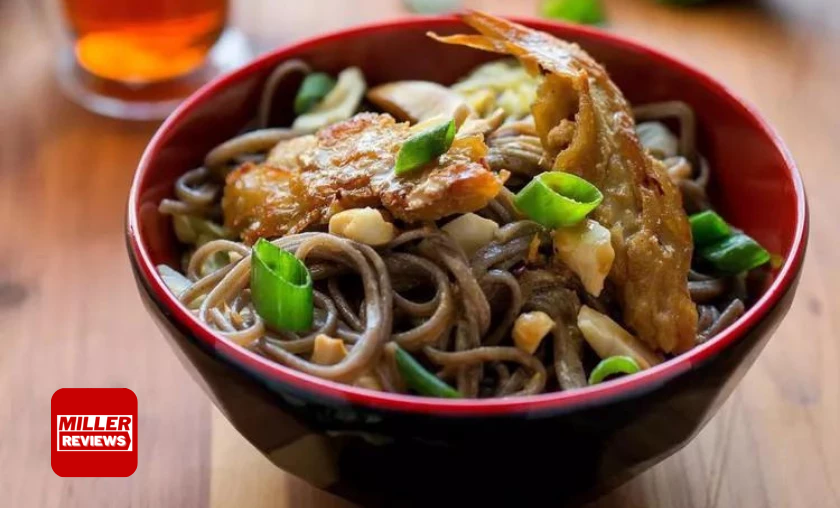
Pictured Recipe: Dan Dan Noodles with Seitan, Shiitake Mushrooms & Napa Cabbage
3 ounces = 5 g carbohydrates
You may be inclined to steer clear of seitan, a vegetarian meat substitute made from wheat gluten, simply because it’s derived from wheat. However, fear not, for a 3-ounce serving of this marvelous creation presents us with a mere 2 grams of carbs and a remarkable 12 grams of protein, according to the ever-reliable USDA. Whether you choose to purchase a seitan or unleash your culinary skills to craft your own, the beauty of it all is that you can adorn a seitan with flavors that mimic the essence of meat. So, indulge in the delectable world of seitan and revel in its low-carb, protein-packed glory.
Peanut Butter:
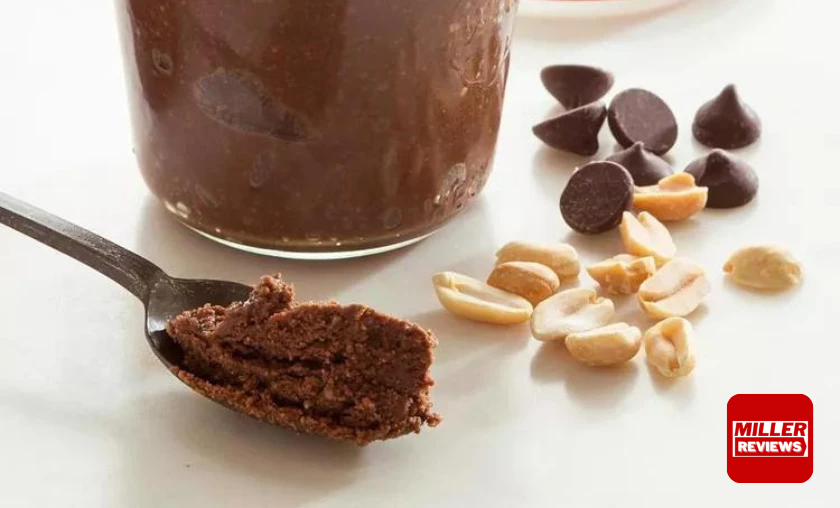
Pictured Recipe: Chocolate Peanut Butter
2 tablespoons peanut butter = 7 g carbohydrates
Technically, they belong to the legume family, just like beans, which means they do contain carbohydrates—specifically 7 grams per serving. However, allow me to share a delightful secret with you. Two tablespoons of peanut butter offer not only those 7 grams of carbs but also a splendid 7 grams of protein and 16 grams of healthy, satiating fats, as confirmed by our dear friends at the USDA.
Now, my loves, here’s a little tip to keep in mind. Many peanut butter brands tantalize our taste buds with added sugar, including tempting flavors like honey and maple syrup. If you wish to keep your sugar (and carb) intake in check, I recommend selecting peanut butter made solely from peanuts. But don’t stop there, my darlings, for the nutty world has so much more to offer. Consider exploring the wonders of almond butter, cashew butter, and pistachio butter. They, too, my loves, are marvelous choices that will bring joy to your taste buds.
So, embrace the legume magic of peanuts and their delightful peanut butter, and relish in the balance of carbs, protein, and healthy fats. And, if you’re feeling adventurous, let the nut-butter world enchant you with its myriad options.
Low-Carb Snacks
Nuts:
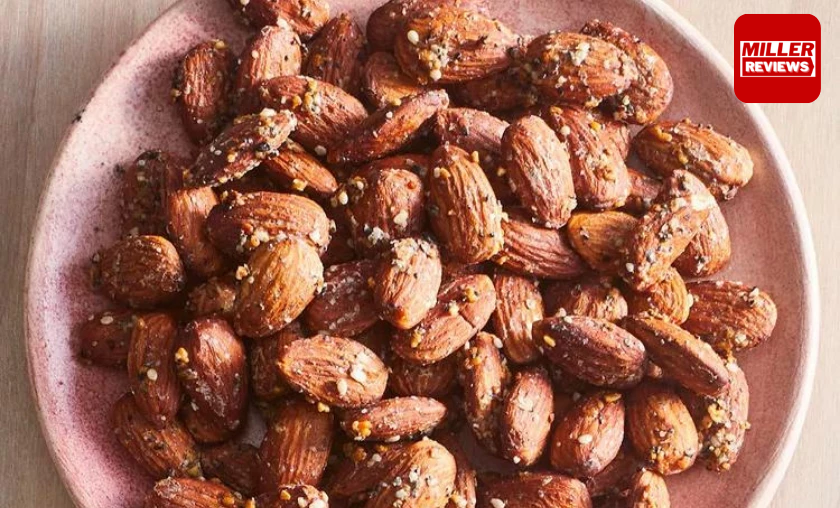
Pictured Recipe: Everything-Seasoned Almonds
1 package (50 g) = 10.5 g carbohydrates
When it comes to protein and carbs, consider the following options:
- Almonds, with 6 grams of protein and 6 grams of carbs in 23 whole ones
- Walnuts offer 4 grams of protein and 4 grams of carbs in 14 halves
- Pistachios present 6 grams of protein and 8 grams of carbs in 49 nuts
Now, the beauty of nuts doesn’t end there, my loves. They also bring the gift of fiber, a nutrient that adds staying power to your meals and snacks. These marvelous choices provide 2 to 4 grams of fiber per serving. And here’s a delightful tidbit for you, my darlings: the 2020-2025 Dietary Guidelines for Americans suggest that females aim for 25 grams of fiber per day and males for 34 grams per day. That means indulging in that one serving of nuts grants you 6% to 16% of your daily fiber intake.
So, embrace the wonders of nuts, my loves. Delight in their protein and carb balance and their fiber-filled goodness. Let nuts be your nutritious companion on this delightful journey of culinary exploration.
Mozzarella:
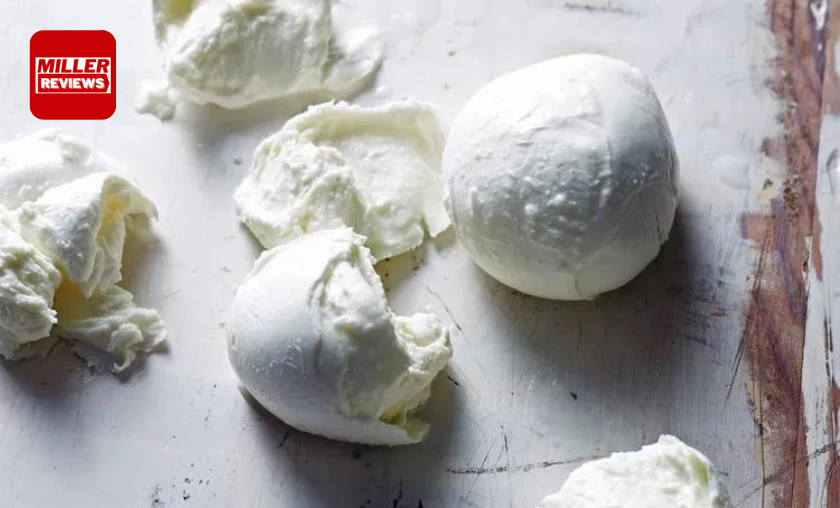
BRETT STEVENS/GETTY IMAGES
One mozzarella stick (28 g) = 1.3 g carbohydrates
behold the cheese stick, a convenient source of protein. A single serving provides a mere 85 calories, accompanied by 7 grams of protein and approximately 1.3 grams of carbohydrates. But that’s not all! A delightful revelation from a 2020 review in Current Nutrition & Food Science tells us that indulging in cheese may introduce beneficial bacteria to your gut, promoting its health. So, my loves, savor the goodness of cheese sticks, relish in the protein, and let your gut flourish with delight.
Olives:
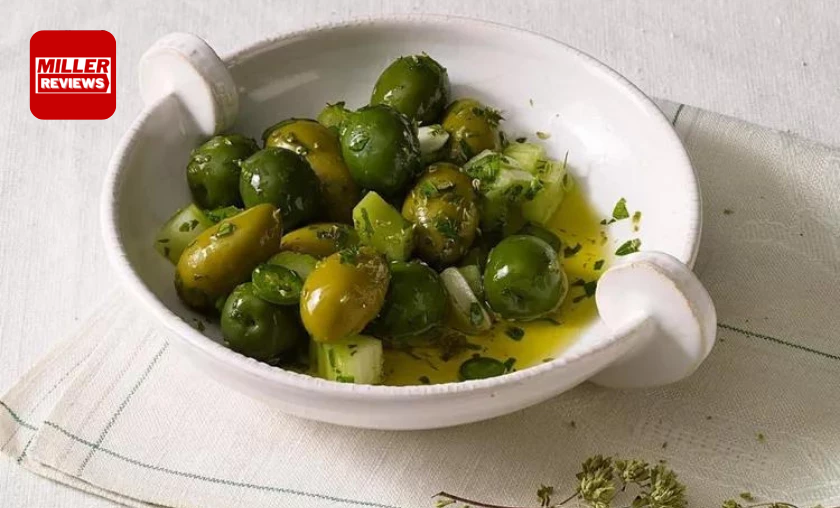
Pictured Recipe: Sicilian Marinated Olives
1/4 cup olives = 2 g carbohydrates
These marvelous morsels are not only bursting with flavor but also bring the gift of heart-healthy monounsaturated fatty acids. Oh, and here’s a delightful nugget of information for you: a mere quarter cup of olives amounts to just 40 calories, according to our dear friends at the USDA. And the best part? You can even find them conveniently packed in snack packs, perfect for satisfying your cravings on the go. So, indulge in the delectable world of olives, relish in their flavor, and nourish your heart with every delightful bite.
Jerky:
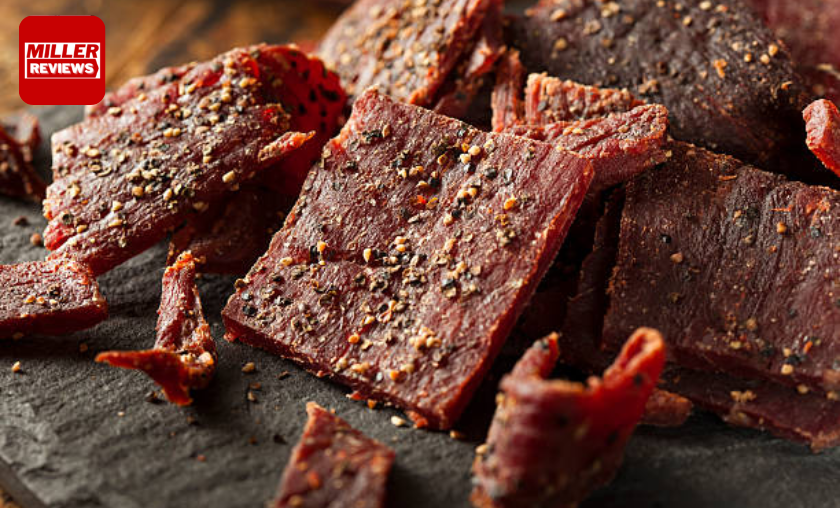
1-ounce beef jerky = 3 g carbohydrates
Let me introduce you to the revamped delight of jerky. This isn’t your ordinary jerky; it has undergone a gourmet transformation. Picture responsibly raised turkey, chicken, beef, and bison mingling with inventive flavors like herbs, citrus, and teriyaki. Oh, the culinary wonders! And here’s the best part: each 1-ounce stick offers approximately 10 grams of protein and a mere 3 grams of carbs. It’s the perfect solution to conquer those mid-afternoon munchies without succumbing to the siren call of chips. Remember, my darlings, seek out brands with the lowest sodium content for a delightful experience.
Hummus & Crudités:
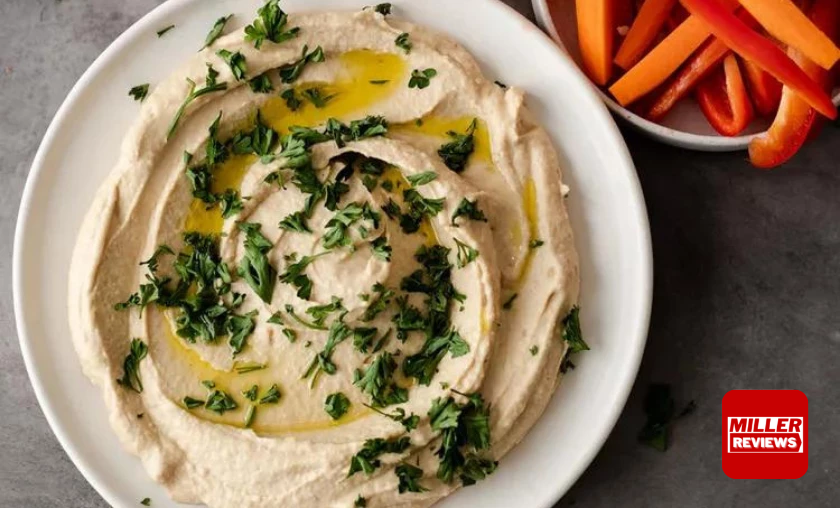
Pictured Recipe: Classic Hummus
2 tablespoons = 6 g carbohydrates
Picture crisp, non-starchy veggies like cucumbers and celery, eagerly waiting to be plunged into the creamy delight of hummus. You see, hummus holds a secret—it’s not just a delectable spread but also a source of protein, offering approximately 2.5 grams per two tablespoons, courtesy of the mighty chickpeas. And that’s not all! Hummus is also brimming with essential B vitamins for transforming food into fuel. So, my loves, let our marvelous collection of Healthy Hummus Recipes ignite your culinary imagination as you create tempting meals and snacks with the power of hummus.
Low-Carb Vegetables
Cauliflower:
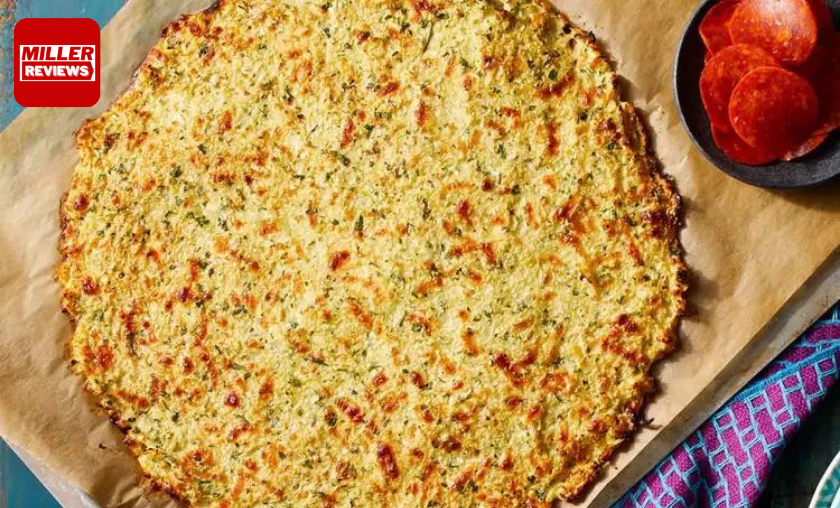
Pictured Recipe: Cauliflower Pizza Crust
1 cup raw = 5.5 g carbohydrates
behold the versatile wonder of cauliflower, a cruciferous vegetable that low-carb enthusiasts adore. It can be mashed like potatoes or transformed into “cauliflower rice” using a trusty food processor. This delightful rice substitute opens up possibilities, from nourishing rice bowls to tantalizing stir-fries. And here’s a little secret: you can even find packaged cauliflower rice in some grocery stores, making kitchen prep a breeze. For further inspiration, my loves, explore our Healthy Cauliflower Recipes treasure trove and let your taste buds dance with delight.
Zucchini:

Pictured Recipe: Spiralized Zucchini & Summer Squash Casserole
1 cup raw = 3.6 g carbohydrates
Let’s celebrate the fabulousness of zucchini! This marvelous veggie is a true chameleon in the kitchen. With the help of a trusty vegetable peeler or a delightful spiralizer, zucchini effortlessly takes on the form of spaghetti or linguini, giving you a low-carb alternative to traditional pasta. So, embrace the magic of zucchini and let your creativity soar with its noodle-like wonders.
Spaghetti Squash:
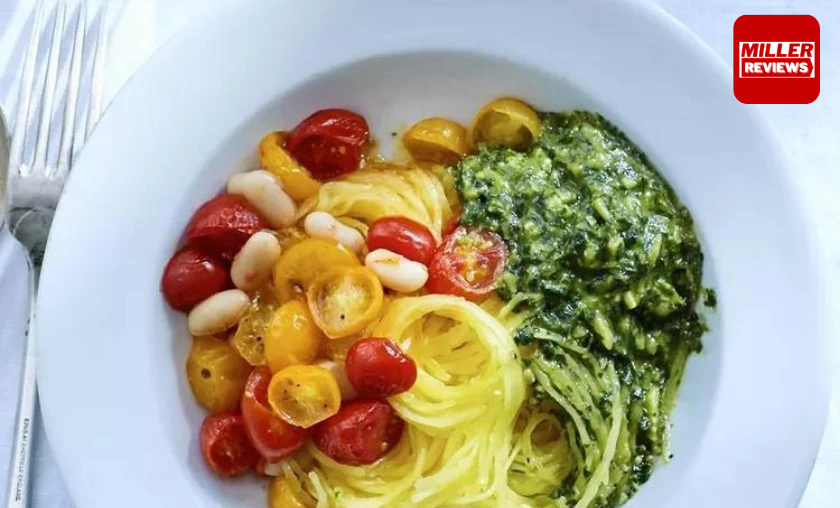
Pictured Recipe: Spaghetti Squash with Roasted Tomatoes, Beans & Almond Pesto
1 cup cooked = 10 g carbohydrates
Let me introduce you to the marvel that is spaghetti squash! Bake or roast this glorious vegetable, and then, with a gentle flick of a fork, you’ll uncover its magical “squash noodles.” Just like zucchini noodles, you can crown them with delectable pasta sauce. But wait, there’s more! You can also incorporate them into scrumptious casseroles or lasagnas, for the squash has a divine ability to absorb and enhance any flavors it encounters. Embrace the versatility of spaghetti squash and let your culinary adventures begin!
Sweet Potatoes:

Pictured Recipe: Sweet Potato Skins with Guacamole
1 medium (150 g) = 25 g carbohydrates
All taters, my friends, fall under the category of starchy veggies, along with their pals, corn, and peas. As a result, they do tend to have higher carb content. A medium-sized sweet spud, for instance, boasts around 25 grams of carbohydrates. To create a balanced and nutritious meal, pair it with some tasty baked chicken or fish and a generous serving of green goodness like broccoli. What’s more, these sweet potatoes also offer a splendid dose of fiber (4 grams) to aid in digestion, not to mention their impressive array of disease-fighting antioxidants known as carotenoids. Enjoy the flavors and benefits, my lovelies!
Low-Carb Fruits
Berries:
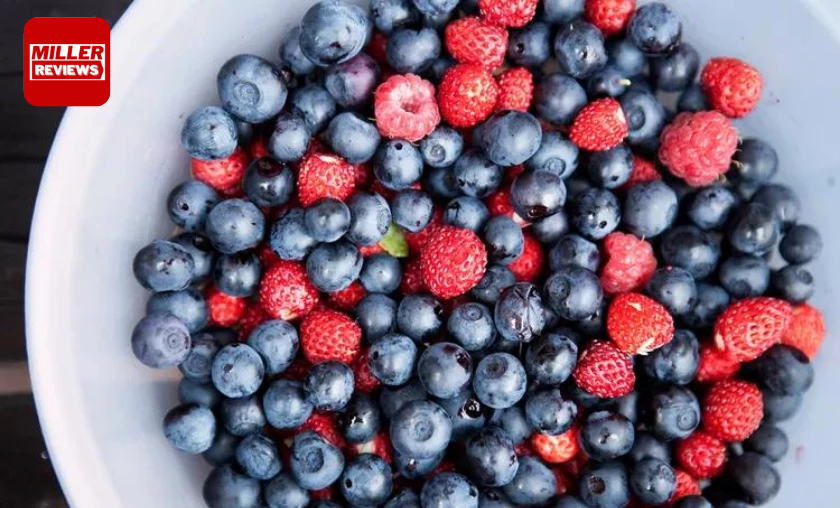
1 cup mixed berries = 15 g carbohydrates
Berries are fantastic! They’re low in sugar and rich in fiber, ensuring a steady supply of energy for your body. When you’re craving some fruity goodness, go for blueberries, blackberries, strawberries, or raspberries. Blueberries offer 86 calories and 22 grams of carbs per cup, while blackberries provide 65 calories and 14 grams of carbs per cup. Strawberries come in at 48 calories and 12 grams of carbs per cup, and raspberries contain 78 calories and 18 grams of carbs in 1 cup. Enjoy these delightful berries on their own or use them to enhance various dishes. They’re a delightful treat for your taste buds and your well-being!
Cantaloupe:
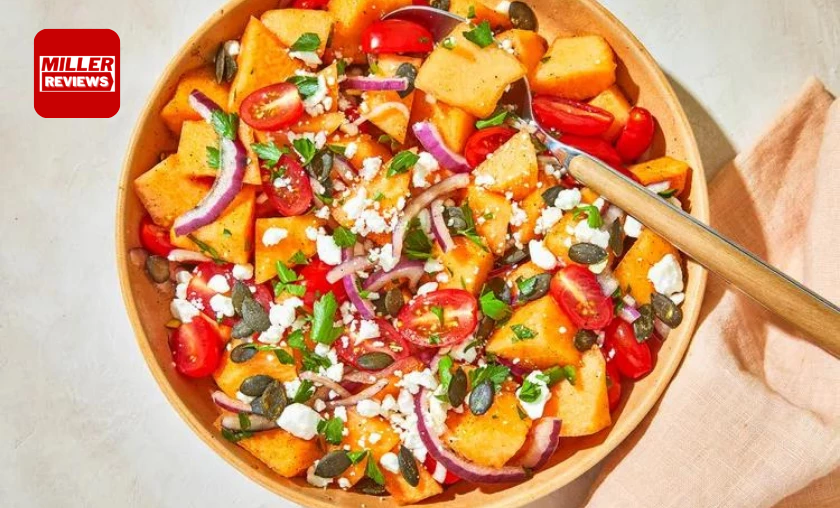
Pictured Recipe: Cantaloupe Salad with Lime, Pepitas & Cotija
1 cup = 13 g carbohydrates
Cantaloupe is super refreshing! It’s a low-calorie fruit choice with only 53 calories per cup of cubes and 13 grams of carbs. Enjoy cantaloupe on its own, or add it to salads and smoothies for a delicious and healthy twist.
Plums:
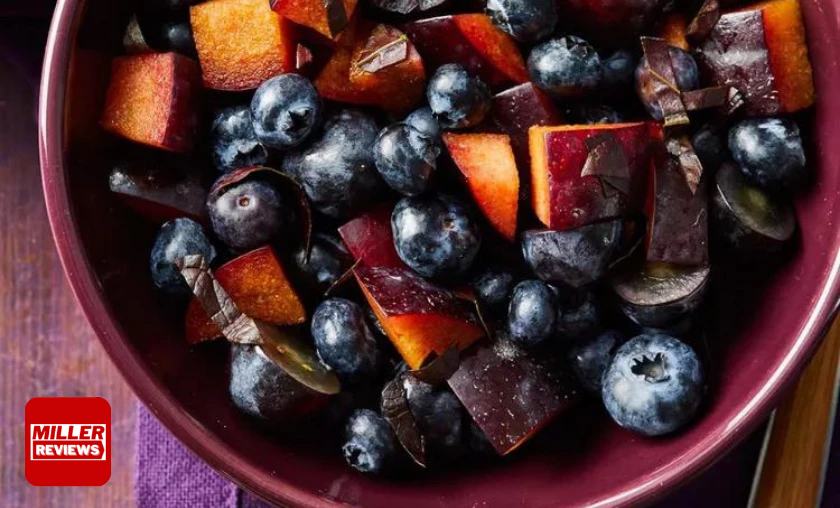
Pictured Recipe: Purple Fruit Salad
1 fruit = 9 g carbohydrates
Plums are a great choice due to their built-in portion control and portability. They make a nutritious snack with only 35 calories, 9 grams of carbs, and 1 gram of fiber per fruit. If you’re looking for inspiration, explore our collection of Healthy Plum Recipes for delicious ideas beyond eating them raw. Enjoy the goodness of plums in various ways!
Fresh Fruit:
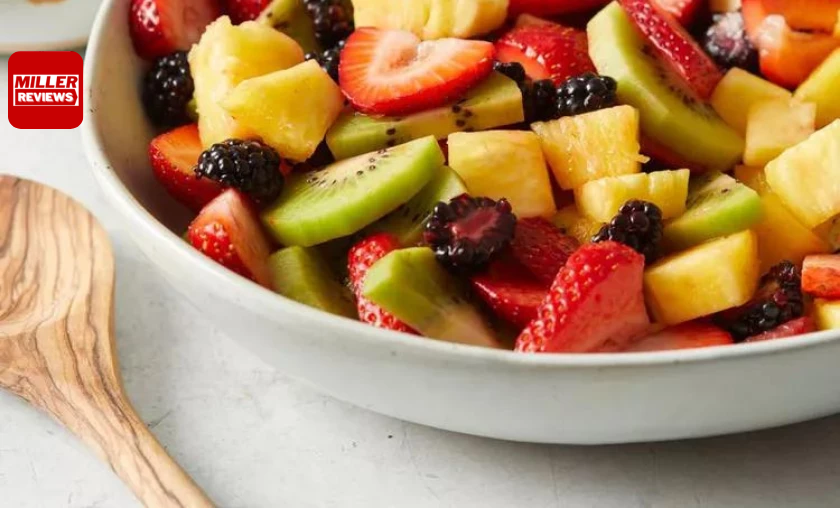
Choose fresh or frozen fruit over juice for a healthier option. Juice lacks fiber and has more sugar, causing blood sugar to spike quickly. Although nutritious, dried fruit is more calorie and carb-dense than whole fruit. For instance, 1/2 cup of dried apricots contains 193 calories and 50g of carbs. If you crave dried fruit, enjoy a small handful along with nuts for added nutrition and satiety.
Low-Carb Dairy
Greek Yogurt:

Pictured Recipe: Strawberry-Chocolate Greek Yogurt Bark
1 cup = 9 g carbohydrates
Include Greek yogurt in your low-carb diet as it’s high in protein. A cup of non-fat Greek yogurt provides 25 grams of protein and just 9 grams of carbs. It’s also a good source of calcium for bone health. Remember to choose plain yogurt to keep the carb content low, as fruit blend varieties contain added sugar and three times the carbs.
Kefir:
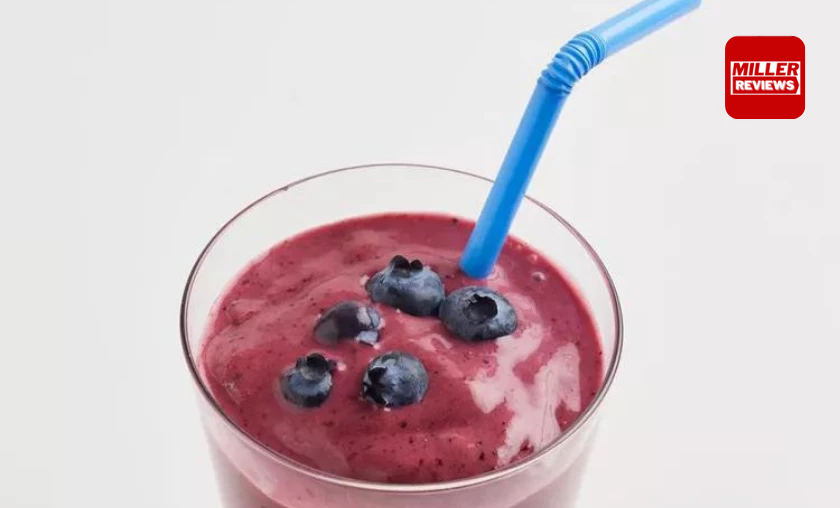
Pictured Recipe: Berry-Kefir Smoothie
1 cup = 18 g carbohydrates
Choose kefir as a nutritious alternative to milk. This tangy fermented milk drink contains probiotics that support gut health. While it has a similar carb content to milk, kefir is low in lactose, making it easier to digest. A cup of kefir offers 9 grams of protein, 12% of your daily vitamin D requirement, and almost one-quarter of your daily calcium needs. Try substituting kefir for yogurt in your smoothies for a protein boost.
Non-Dairy Milks:
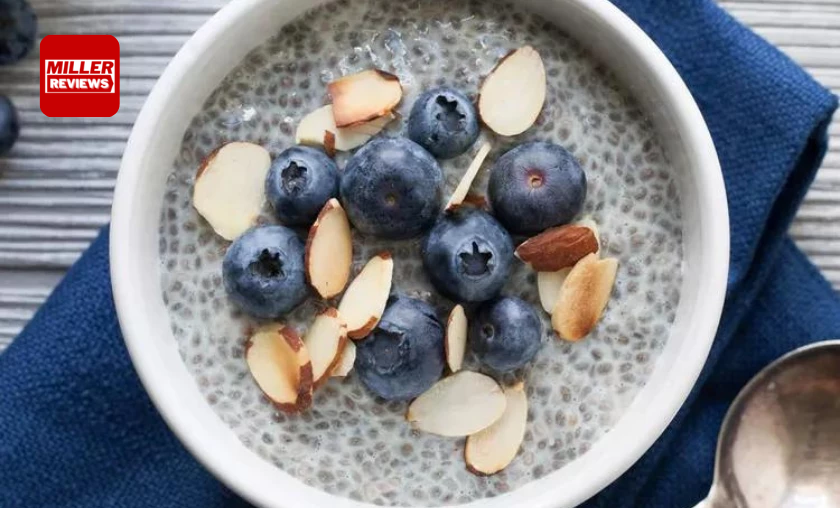
Pictured Recipe: Blueberry Almond Chia Pudding
1 cup almond milk = 3.2 g carbohydrates
When opting for non-dairy milk, consider the nutritional differences. Soy milk is comparable to cow’s milk, with 10 grams of carbs per cup. Choose low-carb options like almond milk and coconut milk.
Note that rice and oat milk contain over 20 grams of carbs per cup, surpassing cow’s milk and soy milk. Be mindful of added sugars in non-dairy milk, as they contribute extra carbs and calories.
Cottage Cheese:
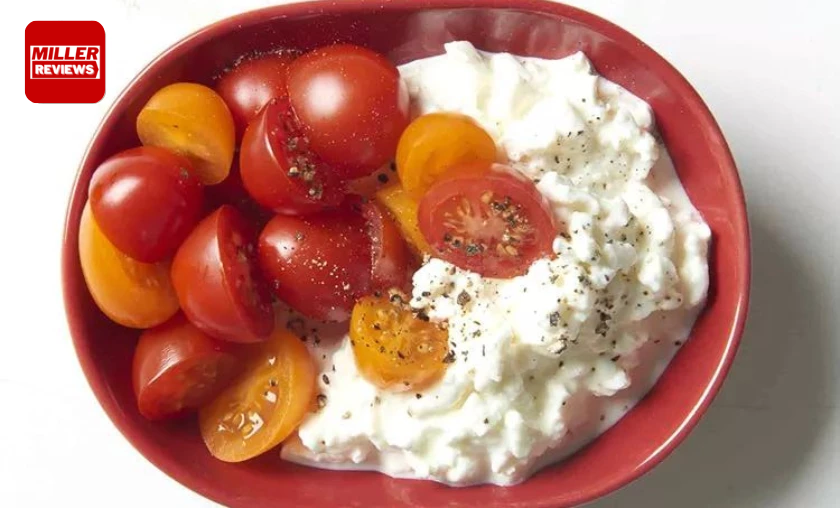
1 cup = 9 g carbohydrates
Cottage cheese is a protein powerhouse, providing 23 grams per cup, similar to Greek yogurt. Use cottage cheese to add variety to your breakfast, or enjoy it as a salad or quick snack with a sprinkle of cinnamon and berries.
Low-Carb Desserts
Whipped Coconut Milk and Berries:
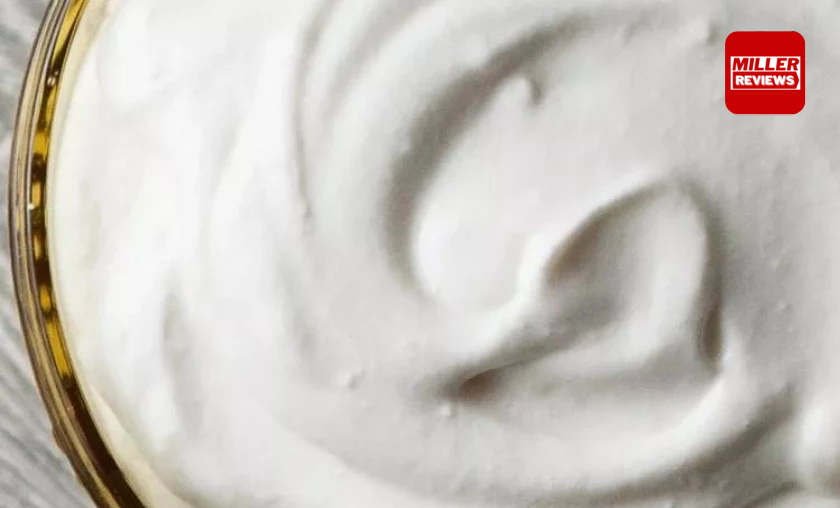
Pictured Recipe: Coconut Whipped Cream
1/3 cup lite coconut milk = 2 g carbohydrates
Canned “lite” coconut milk is a great option with only 50 calories and nearly 2 grams of carbs in one-third cup. Use the thick, custard-like milk to make a delicious nondairy whipped cream for topping berries, creating a low-carb dessert.
Almond-Flour Baked Treats:
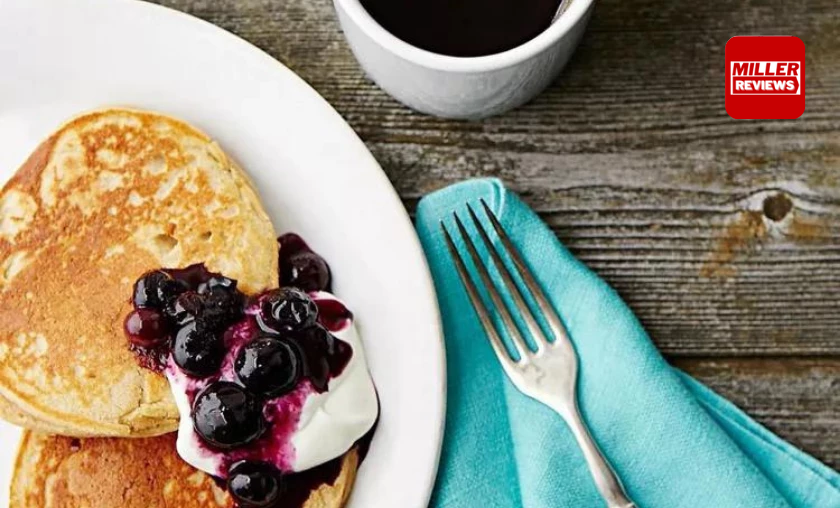
Pictured Recipe: Oatmeal-Almond Protein Pancakes
1/3 cup almond flour = 5 g carbohydrates
When baking desserts, consider using almond flour (or almond meal) as a substitute for regular flour. It’s made from finely ground almonds and adds nutrients like magnesium, potassium, and extra protein to waffles, cookies, cakes, and sweet breads.
Avocado:
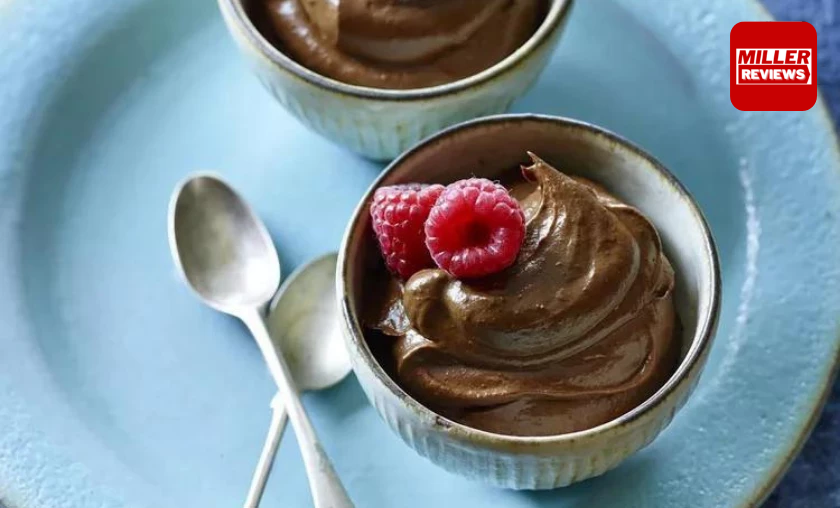
Pictured Recipe: Chocomole Pudding
1 fruit (150 g) = 13 g carbohydrates
Make avocado pudding by blending nut milk, avocado, and cocoa powder in a food processor. Avocado is a fruit with healthy fats. Despite being around 240 calories, it provides 10 grams of fiber and 3 grams of protein, per the USDA.
Conclusion
This comprehensive list of 30 low-carb foods provides a wide range of delicious options to support your healthy eating goals. From protein-packed choices like tofu and cottage cheese to nutrient-rich fruits and vegetables like berries and zucchini, there are plenty of satisfying options to enjoy while keeping your carbohydrate intake in check.
Whether you’re following a low-carb diet or simply looking to incorporate more nutritious choices into your meals, this list serves as a valuable resource for making informed food choices. So, go ahead and explore the possibilities, get creative in the kitchen, and embrace the benefits of a low-carb lifestyle with this great list of options.
For More amazing articles related to Health Check out our website Over Here
To Read more similar articles click here
Thanks for visiting our Website. If you appreciate our work, kindly show us some support in our comments section 🙂